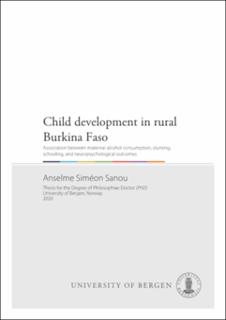| dc.contributor.author | Sanou, Anselme Siméon | en_US |
| dc.date.accessioned | 2020-06-02T11:43:00Z | |
| dc.date.available | 2020-06-02T11:43:00Z | |
| dc.date.issued | 2020-06-04 | |
| dc.identifier.isbn | 978-82-308-7080-8 | en_US |
| dc.identifier.isbn | 978-82-308-7169-0 | en_US |
| dc.identifier.uri | https://hdl.handle.net/1956/22430 | |
| dc.description.abstract | Introduction: The general aim of this thesis was to evaluate the association of maternal alcohol consumption, stunting (low height-for-age) and schooling on neuropsychological outcomes among children in rural Burkina Faso based on data from the Burkina Faso’s site of the PROMISE Saving Brain’s study. Methods: The thesis is based on data collected from the PROMISE Saving Brain study, a follow-up study of a community-based cluster-randomized trial on promotion of exclusive breastfeeding. Children were re-enrolled at age 6-8 years in Uganda and Burkina Faso. In the site of Burkina Faso, a total of 561 children were alive, traced and re-consented to participate in the evaluation of neuropsychological outcomes. The Kaufman Assessment Battery for Children, 2nd edition (KABC-II), the Children’s Category Test Level 1 (CCT-1), and the Test of Variable of Attention (TOVA) have been used. Effect size differences using Cohen’s d and linear regression were used to analyse any associations. The theoretical framework of the 2016 Lancet series was used to categorize all the variables. In a final analysis, we included all the variables in one single analysis. Results: Children whose mothers reported alcohol consumption during pregnancy performed significantly more poorly for the KABC-II sub-tests ‘Atlantis’ (adjusted coefficient = -4.61, p = 0.02), ‘Number recall’ (adjusted coefficient = -0.54, p = 0.04), and for ‘Triangle’ (adjusted coefficient = -0.61, p = 0.03), and scored a significantly higher number of errors at CCT-1 (adjusted coefficient = 2.5, p = 0.002). Stunted children performed significantly less well in KABC-II general cognition (p ≤ 0.0001), TOVA ‘attention’ (p = 0.04), and scored a significantly higher number of errors for CCT-1 ‘cognitive flexibility’ (p = 0.02), and for TOVA ‘inhibition’ (p = 0.02). On the TOVA test, children not in school performed significantly worse for ‘Response time’ (p ≤ 0.0001), ‘Response time variability’ (p ≤ 0.0001), ‘Errors of omission’ (p = 0.001), ‘Errors of commission’ (p = 0.003) and ‘D prime score’ (p ≤ 0.0001) compared to children in school. In the multivariable model with all the different variables including 17 neuropsychological outcomes, schooling was associated with 12 of the neuropsychological outcomes (‘Atlantis’, ‘Conceptual thinking’, ‘Face recognition’, ‘Story completion’, ‘Rover’, ‘Triangle’, ‘Word order’ ‘General cognition’, ‘Total Response Time’, ‘Total Response Time Variability’, ‘Total errors of omission’ and ‘D prime score’), stunting was associated with 04 neuropsychological outcomes (‘Atlantis’, ‘Triangle’, ‘General cognition’, and ‘D prime score’), and maternal alcohol consumption during pregnancy was associated with 04 neuropsychological outcomes (‘Triangle’, ‘Word order’, ‘General cognition’ and CCT-1). Conclusion: Assessing neuropsychological performances among children with many risk factors is complex. This thesis may have found some significant associations between maternal alcohol consumption during pregnancy, stunting and schooling, and poorer neuropsychological performances of children aged 6-8 years but cannot conclude on any causal relations. More structured studies with prospective collection of exposure data are needed to demonstrate causal relationships. However, this thesis shows the importance and the challenges of studying neuropsychological performances in multi-risk contexts and highlights the need for continuous promotion of child development to support children to reach their developmental potential. | en_US |
| dc.language.iso | eng | eng |
| dc.publisher | The University of Bergen | eng |
| dc.relation.haspart | Paper I: Sanou AS, Diallo AH, Holding P, Nankabirwa V, Engebretsen IMS, Ndeezi G, Tumwine JK, Meda N, Tylleskar T, Kashala-Abotnes E. Maternal alcohol consumption during pregnancy and child’s cognitive performance at 6–8 years of age in rural Burkina Faso: an observational study. PeerJ. 2017 Jun 30;5:e3507. The article is available at: <a href="http://hdl.handle.net/1956/16851" target="blank">http://hdl.handle.net/1956/16851</a> | en_US |
| dc.relation.haspart | Paper II: Sanou AS, Diallo AH, Holding P, Nankabirwa V, Engebretsen IMS, Ndeezi G, Tumwine JK, Meda N, Tylleskar T, Kashala-Abotnes E. Association between stunting and neuro-psychological outcomes among children in Burkina Faso, West Africa. Child and Adolescent Mental Health and Psychiatry 2018;12:30. The article is available in the main thesis. The article is also available at: <a href="https://doi.org/10.1186/s13034-018-0236-1" target="blank">https://doi.org/10.1186/s13034-018-0236-1</a> | en_US |
| dc.relation.haspart | Paper III: Sanou AS, Diallo AH, Holding P, Nankabirwa V, Engebretsen IMS, Ndeezi G, et al. Effects of schooling on aspects of attention in rural Burkina Faso, West Africa. PloS One. 2018;13(9):e0203436. The article is available in the main thesis. The article is also available at: <a href="https://doi.org/10.1371/journal.pone.0203436" target="blank">https://doi.org/10.1371/journal.pone.0203436</a> | en_US |
| dc.title | Child development in rural Burkina Faso. Association between maternal alcohol consumption, stunting, schooling, and neuropsychological outcomes | en_US |
| dc.type | Doctoral thesis | |
| dc.rights.holder | Copyright the author. All rights reserved | |
